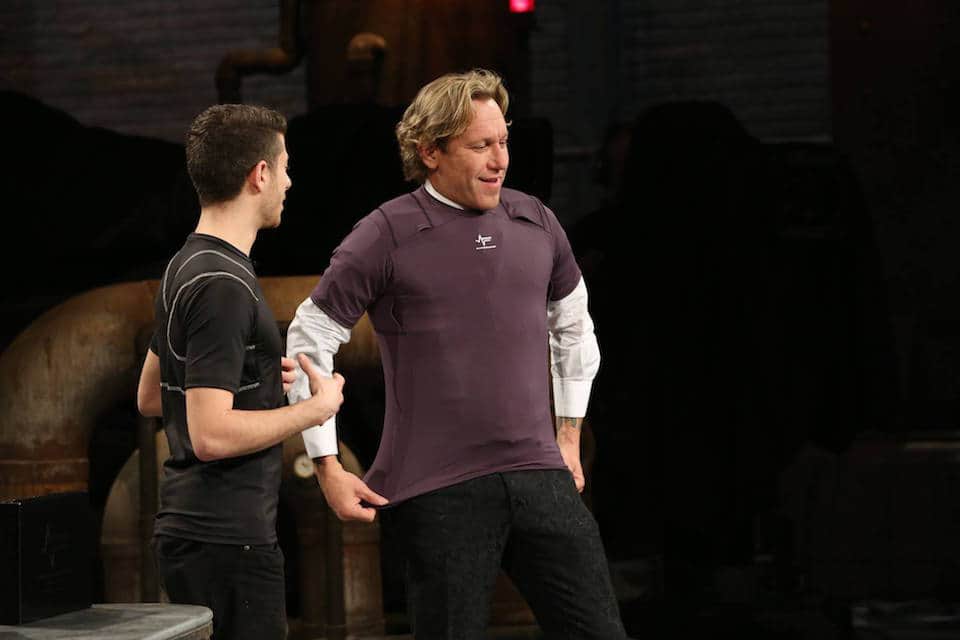U of T graduate Noureddin Chahrour has received $90,000 from the popular Canadian reality show Dragons’ Den. On the show, entrepreneurs pitch their business ideas to a panel of venture capitalists — the “dragons” — in the hope of securing their investment. Chahrour will put the money towards his company, Adrenalease.
Chahrour, a kinesiology student, spent much of his time at U of T hunched over while studying. Like many other students, he subsequently developed bad posture and back pain. Any effort that he made to relieve the pain was of no use; he found that stretching exercises didn’t offer much relief. After consulting with physicians, Chahrour learned that back braces would actually worsen the situation as the retractive position would force his muscles into relying on the brace, which would ultimately weaken his back. This led Chahrour to a ‘eureka’ moment, and Adrenalease was born.
According to Chahrour, Adrenalease is where “fashion meets ergonomics” in the form of an adjustable line of fitness clothing that holds the wearer in an optimal posture position. By pulling back on the shoulders, the shirt aims to also improve patterns of breathing while exercising. After developing the idea, Chahrour consulted with kinesiology professors Margaret MacNeill and Jack Goodman, who supported his idea and encouraged him to develop a business.
Goodman, Chahrour’s former professor and supervisor during his research project, said that Chahrour is “really the author of his own success.” Goodman emphasized the importance of not selling faulty ideas of merchandise, and ensured that Chahrour’s design was built on accurate research findings.
MacNeil agreed with Goodman’s sentiments and expressed her excitement at seeing Chahrour’s project come to fruition. “[Noureddin Chahrour] roared into my health com class in FKPE two years ago and used assignments to get students to improve their posture with a mobile phone-based health campaign (while showcasing a shirt he thought might also pull their posture up),” MacNeill said, calling him the “posture whisperer.” MacNeill further remarked that Chahrour was an excellent health science student, “one who embraced all areas of science to solve a problem in a complex manner linking cell to society.”
“His inventor’s intuition, entrepreneurial spirit and health educator soul has coalesced into a wearable technology helping both Olympic athletes and aging [professors] curled over their computers.”
Following the development of Adrenalease, Chahrour auditioned for Dragons’ Den in an attempt to gain attention and snowball the product. He was accepted to appear on the show on April 13, just one day before one of his final exams at U of T, where he graduated in 2015 with an honours degree in kinesiology.
The episode featuring Chahrour aired on November 18 and showed Chahrour receiving three offers from four dragons, valuing the company as high as $500,000. Chahrour accepted bids from dragons Mangit Minhas, Michelle Romanow, and Jim Treliving amounting to $90,000 for 30 per cent of the company. Chahrour said he landed on the decision because of Treliving’s connections with the NHL and his enthusiasm following missing out on a bid for compression shorts which later were sold to Under Armour for $10 million.
Today, Chahrour works with the Impact Centre at the University of Toronto, where he receives guidance on leading his company and guiding its growth, learning about everything from mentors to business advisors and marketing plans. The Impact Centre also provides an office space for Adrenalease to conduct its work at the moment. Together with three interns, Adrenalease soon plans to release a sports bra that is the first of its kind with adjustable straps and patented ergonomic technology.
When asked about advice for other entrepreneurial-minded students, Chahrour recommended that students who are interested in entrepreneurship start with a topic that they are passionate about and get involved with an accelerator program when they develop a good idea.
Instead of reinventing the wheel, Chahrour advised that students find something that exists and perfect it, as niche markets can offer room for significant growth. Chahrour also suggested developing a canvas model and business plan as well as a sales strategy when embarking on an entrepreneurial venture.
When asked about what the future has in store, Chahrour said, “I was born and raised as an entrepreneur. I love what I’m doing, I don’t have a boss telling me what to do and where to go. I can make my own decisions and own hours, I love that about my job and I love everything that has to do with it… even if I get a multi-million dollar offer and sell this, I will stay in the field of entrepreneurship.”


